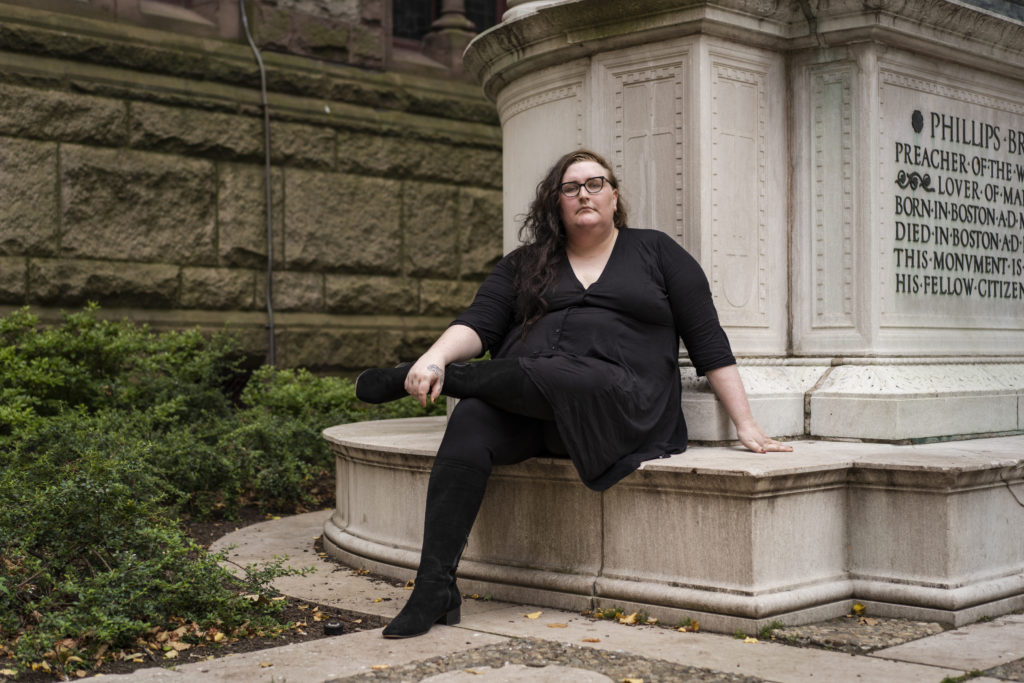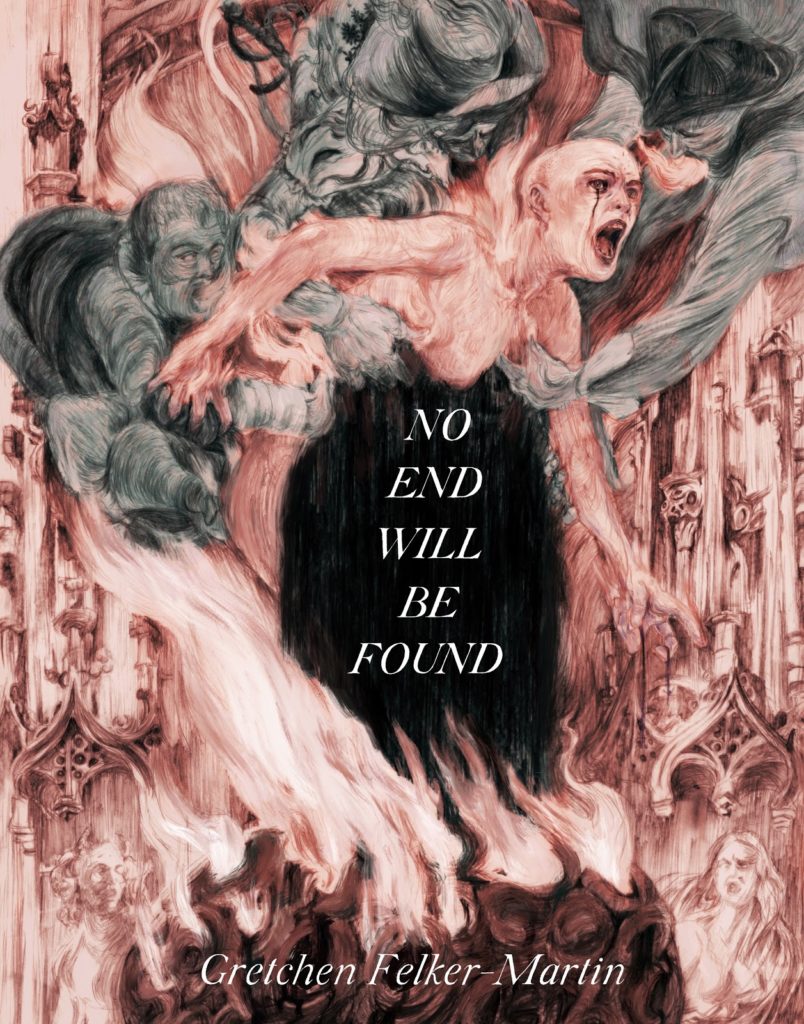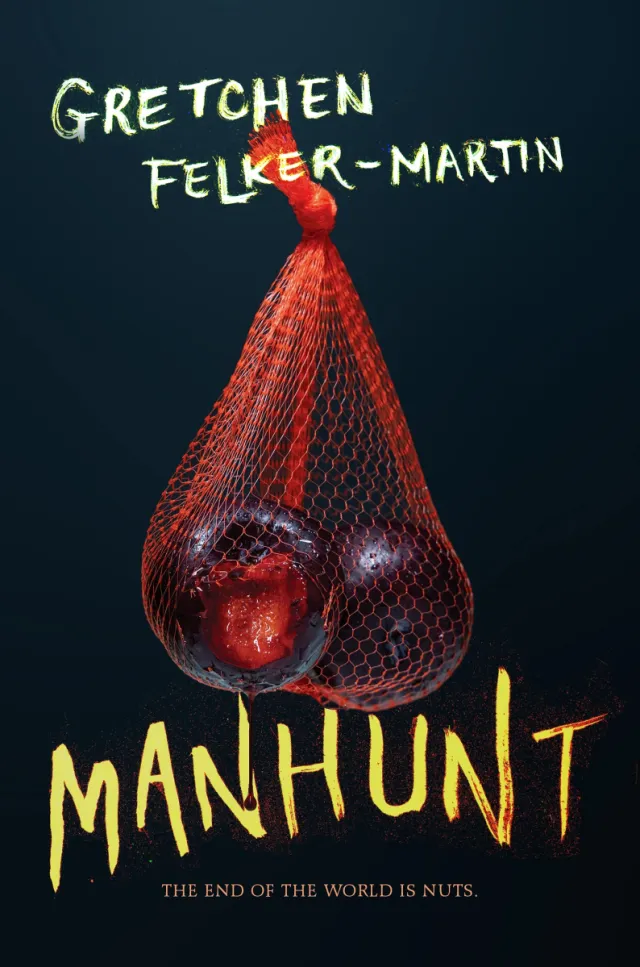
Gretchen Felker-Martin is not brave. “I’m just a cunt,” she says.
There’s a strong anti-assimilationist streak in her writing. In her life. She believes that unbridled expression is a right for marginalized creators, who use transgressive art as “a way to process the poison we’re spoon-fed from birth,” as she wrote for The Outline in 2020. To deny the dark, unruly parts of ourselves is to shut off a part of our humanity. And to shape oneself into something smaller, smoother, more acceptable is to submit to our culture’s desire to annihilate those who will not, or cannot, conform. “There’s something in me that hates being defanged and declawed and made into this image of the wholesome social outcast who just wants to be part of society,” she says over Zoom. “I don’t want to be part of society. I have seen society. I’ve studied it. And I despise it.”
She doesn’t have time for the squeamish, either. Her gory debut novel Manhunt opens with two trans women in post-apocalyptic New England slaughtering a feral man, reduced to a rabid ghoul by a virus that attacks anyone with high testosterone levels in their blood. Without regular infusions of estrogen, the women run the risk of mutating as well. And so they take a sharp knife to a deformed ballsack that, as Felker-Martin writes, “exude[s] a stink like a bath bomb infused with rancid pork.”
A few expert cuts, and it’s down the hatch with the dead man’s festering testicles, which — little known fact —secrete estrogen.
Felker-Martin is laying all her cards on the table, proclaiming through prose whether this book is going to be for you, or it isn’t. J.K. Rowling is burned alive in her castle after a friend with undiagnosed PCOS goes on a rampage, what the characters call “T-Day.” Later on, a woman’s uterus is ripped out in front of a crowd of baying TERFs at a gruesome public execution. The book overflows with sex, at turns intensely erotic and uncomfortably dissociative. To say the gender binary is ‘broken’ in this book is insufficient. It has its spine snapped like a Mortal Kombat fatality.
 All of these details have offended someone. Disgruntled reviewers from across the political spectrum — unsurprisingly, the “gender critical” crowd especially — have described Manhunt as “vile,” “psychotic, “hyper-misogynist fanfic” and a story with “no redeeming value.” The LA Review of Books said Manhunt “cunningly weaves trans determinism, war, and trauma together in an effort to locate joy, empathy, and pleasure in a world on fire.” The Daily Mail called it “filth.” Felker-Martin is pushing to get the latter quote on the cover for its next printing.
All of these details have offended someone. Disgruntled reviewers from across the political spectrum — unsurprisingly, the “gender critical” crowd especially — have described Manhunt as “vile,” “psychotic, “hyper-misogynist fanfic” and a story with “no redeeming value.” The LA Review of Books said Manhunt “cunningly weaves trans determinism, war, and trauma together in an effort to locate joy, empathy, and pleasure in a world on fire.” The Daily Mail called it “filth.” Felker-Martin is pushing to get the latter quote on the cover for its next printing.
Reviewers who get the book rightly notice that its splatterpunk horror is employed in service of a larger project, a desire to connect marginalized people through the counterintuitive medium of body horror. Felker-Martin claims body horror as a genre for trans people, saying, “When you’re trans, you are forced into intimacy with your own body in a way that many people never are.” When you are young and closeted, she said, it is like your body is constricting you, killing you.
“When you are pressed up against the hot burner of dysphoria for that long… the idea of suddenly being at the wheel — even if everything you can make it do is totally horrific and monstrous — is so unbelievably cathartic that it becomes very compelling and moving to a lot of trans people.”
She finds reprieve from dysphoria in films from David Cronenberg or John Carpenter’s The Thing — “You see this process of flesh as a fluid substance. And I was like, ‘oh my God, why does this make me feel so fucking relieved?’” She shrugged when I pointed out how clinical and mechanical the sex is in Cronenberg’s Crash. “Guess there are people who don’t find that really hot,” she says, bored at the mere implication of vanilla smut.
Felker-Martin’s blunt descriptions of the most taboo aspects of her characters’ ‘deviant’ anatomy are shocking at first — a trans woman’s erection, a trans man’s period, a fat woman’s aching knees — these “undesirable” bodies are also written in romantic, even worshipful terms. It short-circuits a lifetime of conditioning about what is sexy, what is shameful and what is okay to talk about. This technique “was me consciously pushing myself to be more open about the interior experience of living in a fat body,” she says. With Manhunt, she brings those experiences to characters whose arcs “aren’t totally about” their bodies, but “are also not separate from” them.
Manhunt’s blend of sexualization and disgust speaks to Felker-Martin’s larger interest in what she calls “abjection,” the embrace of humiliation and suffering that she sees as both a sublimated death drive and an act of defiance. It’s sort of like the emotional equivalent of cutting: drawing a little blood to feel more alive. “I love to pick scabs,” she says. “I love to engage in something that’s painful in order to have a new sensation.”
Her self-published 2017 novella No End Will Be Found pushes transcendence through the visceral even further. It is a first-person account of a teenage wet nurse in 17th century Germany who’s imprisoned, tortured and put to death for witchcraft. The book gets especially graphic when the protagonist is put to the rack; the language used to describe the character’s hip being popped out of joint made mine ache for days. That book was written during a dark decade in Felker-Martin’s life, blackened by extreme poverty, subsistence sex work and an abusive relationship. She says she struggled to be creative.
 When so much energy is being spent making it to tomorrow, there’s not much left to dream. “If you don’t write about it, what are you going to do with it?” she points out.
When so much energy is being spent making it to tomorrow, there’s not much left to dream. “If you don’t write about it, what are you going to do with it?” she points out.
 Felker-Martin has been on the internet since the ‘90s, when she had a LiveJournal full of what she describes as “the worst gothic poetry you can imagine and a lot of really romanticized fiction about suicide.” She chuckles when she remembers her first suicide attempt, cracking open batteries to save the acid into a plastic container. When it came time to drink it, “I half chickened out, half shivered too much and wound up pouring it down my leg,” she says. She accepts the compliment about how hardcore of a method that is to off yourself with grace.
Felker-Martin has been on the internet since the ‘90s, when she had a LiveJournal full of what she describes as “the worst gothic poetry you can imagine and a lot of really romanticized fiction about suicide.” She chuckles when she remembers her first suicide attempt, cracking open batteries to save the acid into a plastic container. When it came time to drink it, “I half chickened out, half shivered too much and wound up pouring it down my leg,” she says. She accepts the compliment about how hardcore of a method that is to off yourself with grace.
Although these days she’s more active on Twitter, it was her writing about Game of Thrones on Tumblr that first got her initially noticed by other critics. When two women who regularly publish work on the internet talk shop, the conversation eventually turns to the freaks. Those compelled to tell you all the ways they wish you would fuck off and die. She’s been the target of doxxing campaigns, which she’s reluctant to talk about in detail. “If anything, they’re making me far more important than I would’ve been otherwise,” she says. “It’s an unfortunate way to get publicity, but if they’re giving it to me, I’ll take it. And I’ll use it to do all the things they’re so afraid I’ll do.”
Felker-Martin currently lives in New England, where “Stephen King is sort of like Johnny Appleseed” for horror writers. “My partners visit fairly often. I see my friends as often as I want to, which is quite a bit, but I spend most of my time alone and I fucking love it,” she says. She doesn’t care much about the current cultural angst over separating oneself from one’s work — “I know who I am when I’m not working, and it’s a crankier version of me.”
Asked about the construction of identity that’s a part of all our online lives, she confesses her friends are constantly making fun of her. They wager they could destroy her prickly brand in 10 seconds. “I’m much sweeter and cuddlier in real life,” she says. “Online is work, and it is a persona. It’s not that it isn’t me. It’s just that it’s me at work.” She speaks tenderly about meeting young trans fans who are energized by the book.
 This softer side even comes across in Manhunt. By the time our protagonists are preparing for a final showdown with the TERF army, they’ve finally found the heartbreaking tenderness and real love worth fighting for. They’ve found people who have seen them at their weakest and messiest and most cowardly, and who cherish them anyway.
This softer side even comes across in Manhunt. By the time our protagonists are preparing for a final showdown with the TERF army, they’ve finally found the heartbreaking tenderness and real love worth fighting for. They’ve found people who have seen them at their weakest and messiest and most cowardly, and who cherish them anyway.
“Community” is a fraught word in Manhunt: At one point, Beth, the book’s least “passable” trans woman, recalls her “queer community” housemates kicking her out for being a “potential vector” of the T-Day virus. Beth talks a lot about looks, and hard faces, and how saying nothing reveals more about a person’s true feelings and intentions than their words. This reads like hard-won wisdom. As raw of a wound as when Robbie, Manhunt’s trans male protagonist, recalls being a child and praying for God to make him a man. He was crushed when God never answered — a gender-swapped detail lifted from Felker-Martin’s own life.
The truth, as Gretchen Felker-Martin seems to see it, is that people will betray you. People will laugh at you, and people who you thought were your friends will stay silent when you need them to speak up. But once you pass through the pain, once you take the things that people hate about you and turn them into points of pride, there’s a peace to be found on the other side. It could be why she’s so hard on people who run from what scares them — because they’re only hurting themselves by not engaging with the essential, lifelong work of bringing the darkest and most wretched parts of ourselves into the light and telling them that we love them.
You have to run towards the fear if you ever hope to tame it. To gain control of these nightmares. “When I was about six years old, my father read me The Hobbit for the first time,” she remembers. The ‘riddles in the dark’ chapter gave her horrible nightmares, “screaming, thrashing, sweating.” The next night, her father asked if she wanted to keep going, she says. “And I said, ‘yeah, can you read me the ‘riddles in the dark’ chapter again?’
Katie Rife is a writer and film critic based in Chicago who specializes in genre cinema. She was was thrown into the deep end of the internet as a writer for The A.V. Club from 2014-2022. She currently freelances for Rolling Stone, Vulture, Indiewire, Polygon, RogerEbert.com, FOX and Fangoria, and saved Halloween with the Music Box of Horrors in 2020 and 2021.
Photos by Vanessa Leroy.
